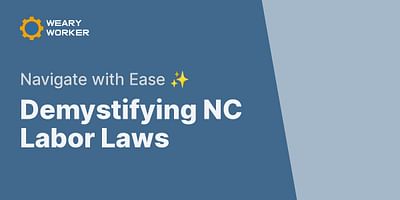Jackson King is a labor rights activist with a passion for social justice. He uses his writing to inspire action and change. Jackson is a Georgia native and enjoys southern cuisine.
Employment law compliance refers to the adherence to the set of laws, standards, and regulations that govern the relationship between employers and employees. These laws are designed to protect the rights of workers, ensure fair treatment, and prevent discrimination and unjust practices in the workplace.
Why You Should Care About Employment Law Compliance 🏛️
Understanding and complying with employment law is crucial for both employers and employees. For employers, non-compliance can result in penalties, lawsuits, and damage to the company’s reputation. For employees, knowledge of these laws can help protect their rights and ensure they are treated fairly at work. You can read more about this in our article Why is Understanding Employment Law Crucial?
Decoding the Crucial Elements of Employment Law 📚
Employment law covers a variety of areas, including but not limited to:
Key Areas of Employment Law
- Wage and Hour Laws: These laws govern how much an employee should be paid and the maximum hours they can work without receiving overtime pay.
- Health and Safety Regulations: These regulations ensure the workplace is safe and free from health hazards.
- Anti-discrimination Laws: These laws protect employees from discrimination based on factors such as race, gender, age, religion, disability, or sexual orientation.
- Family and Medical Leave Laws: These laws provide employees with the right to take leave for family or medical reasons, including childbirth, adoption, or serious health conditions.
- Workers’ Compensation Laws: These laws provide compensation to employees who get injured or become ill due to their job.
Each of these areas has specific laws and regulations employers must follow. For instance, wage and hour laws regulate minimum wage, overtime pay, and other pay-related issues. You can learn more about these key areas in our FAQ post What are Common Employment Laws?
Keeping Up with the Ever-Changing Landscape of Employment Law 🔄
Employment law is not static. It changes and evolves over time, with new laws being introduced and existing ones being amended or repealed. Therefore, it is essential for employers and employees to stay updated with the latest employment law updates.
Quiz on the Latest Changes in Employment Law
Test your knowledge on the latest changes in employment law and its key areas.
Learn more about Quiz on the Latest Changes in Employment Law 📚 or discover other Weary Worker quizzes.
Your Guide to Navigating the Maze of Employment Law Compliance 🧭
Ensuring compliance with employment law is a multi-step process that includes understanding the laws, implementing policies and procedures to adhere to them, and regularly reviewing and updating these policies.
Ensuring compliance with employment law is a multi-step process that includes understanding the laws, implementing policies and procedures to adhere to them, and regularly reviewing and updating these policies.
Furthermore, employers should provide training to their employees on these laws and their rights under them. This can be facilitated by using the 'Florida Employment Law Manual (HR Compliance Library)', which provides comprehensive guidance on employment law compliance.
Furthermore, employers should provide training to their employees on these laws and their rights under them. This can help create a more informed and compliant workplace.
Labor Rights Activists: The Unsung Heroes of Workers' Rights 🦸♂️
Labor rights activists play a vital role in promoting compliance with employment law. They advocate for the rights of workers, raise awareness about employment laws, and fight against labor law violations. You can read more about this in our FAQ post Why Are Labor Rights Perceived as Inadequate in the USA?
To give you a clearer understanding of the role of labor rights activists, let's take a look at an interview with Addie L. Wyatt, a prominent figure in the labor rights movement.
Addie L. Wyatt's contributions to the labor rights movement are a testament to the crucial role that activists play in promoting employment law compliance. As we move forward, it's essential to recognize the importance of such efforts in maintaining fair and equitable workplaces.
In conclusion, employment law compliance is not only a legal obligation for employers but also a crucial aspect of maintaining a fair and equitable workplace. By understanding and adhering to these laws, employers can avoid legal issues, and employees can ensure their rights are protected.
To further emphasize the importance of employment law compliance, let's take a look at this informative video.
As the video explained, staying compliant with employment laws is crucial for maintaining a fair and healthy work environment. It's not just about avoiding legal issues, but also about ensuring the rights and well-being of employees.







![H&R Block Tax Software Premium 2021 [Old Version]](https://m.media-amazon.com/images/I/71q6NKjrwqL._AC_SR525,789_QL65_.jpg)




























